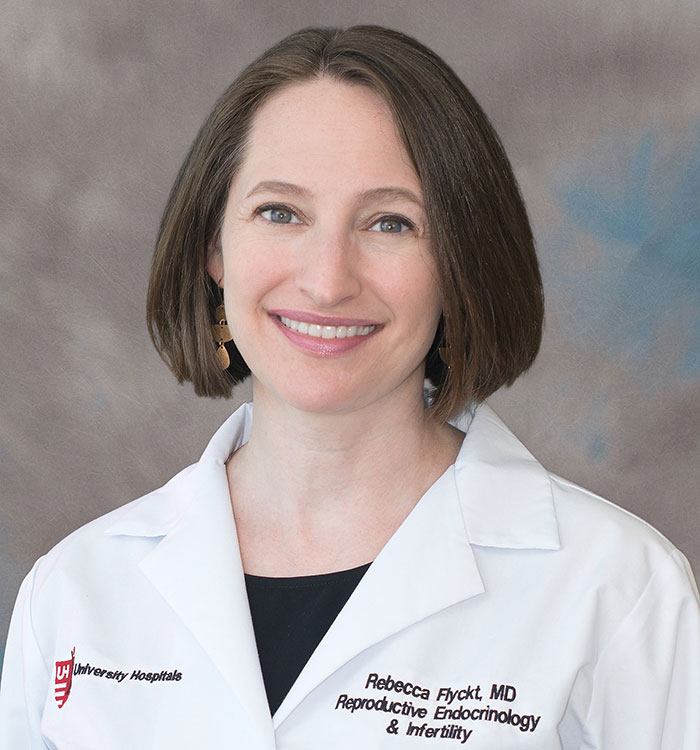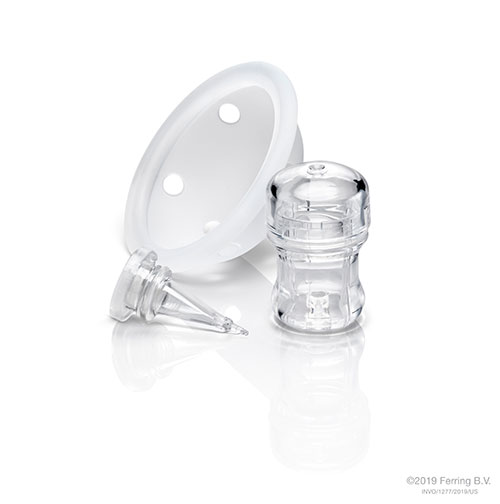New Technology, Talent and Research in Infertility Care
October 07, 2020
Division of Reproductive Endocrinology and Infertility and IVF Program Drive Advances at UH
Innovations in Obstetrics & Gynecology | Fall 2020

University Hospitals is pioneering advances in infertility care through the introduction of new technology, leading reproductive surgeons and cutting-edge research in its Division of Reproductive Endocrinology and Infertility (REI) and in-vitro fertilization (IVF) program.
The effort is being led by Rebecca Flyckt, MD, Division Chief of Reproductive Endocrinology and Infertility, Medical Director of the University Hospitals Fertility Center, and Lilian Hanna Baldwin Endowed Chair in Obstetrics and Gynecology, Associate Professor of Reproductive Biology, Case Western Reserve University School of Medicine. Dr. Flyckt completed her residency at UH over a decade ago, returning “home” to UH last year with the mission of further developing the REI Division and IVF program through innovation.
Expanding Access to IVF
Today, IVF has higher success rates than ever, but its significant cost remains the chief barrier to access for many patients. This year, UH is offering for the first time a technology that could dramatically reduce that cost. “Especially given the UH mission to serve all of our local and regional communities, we seek to expand options for individuals who cannot afford the full costs of in-vitro,” Dr. Flyckt says. “One of the ways we can do this is with the INVOCELL® device.”

INVOCELL® is an intravaginal culture system for embryos. After stimulating the ovaries to grow multiple eggs, eggs are collected and placed along with sperm inside a small device and carried inside the vagina for five days. Afterward, physicians remove the INVOCELL® device along with the embryos that have formed within it and complete an embryo transfer.
“That removes the cost, time, and staffing required for extended culture in the IVF lab, and it allows it to happen naturally inside of this capsule,” Dr. Flyckt says. “It reduces the cost by about half, which brings many of the benefits of IVF to patients who would otherwise struggle to come up with the thousands of dollars required for traditional IVF.”
In addition to reducing the cost of IVF, INVOCELL®is uniquely suited to expedite pregnancy in a few other specific populations, including patients with a history of endometriosis and pelvic surgery, patients with tubal blockages, and patients in same sex relationships who are using donor sperm.
The UH Fertility Center IVF lab is directed by Sung Tae Kim, PhD, HCLD, who has previous experience using this novel reproductive technique.
New Reproductive Surgery Talent
Joseph Findley, MD, in the Division of Reproductive Biology at UH and Assistant Professor at the School of Medicine and a recent addition to the UH team this year, has expertise in minimally invasive surgery and robotics for the correction of common reproductive conditions, such as endometriosis, fibroids and tubal blockages. “He further develops the brand of our division as leaders in reproductive surgery,” says Dr. Flyckt, who is nationally recognized as an expert in reproductive transplantation and minimally invasive fertility preserving techniques.
The division’s surgical prowess is also supported by James H. Liu, MD, Chair of the Department of Obstetrics and Gynecology at UH and the School of Medicine. Dr. Liu performs a wide variety of reproductive surgeries, and he has a focus in treating Asherman’s syndrome. “Between the three of us, I think there is a real passion and a drive forward at UH for using surgical options to correct common gynecologic conditions that result in infertility,” Dr. Flyckt says.
Promoting Research
In addition to its clinical work, the REI division at UH is actively involved in advancing the field of reproductive endocrinology through research. Rachel Weinerman, MD, along with two UH trainees, has received a grant to study COVID-19 antibodies and their effect on IVF fertilization cycles and early pregnancy.
The UH Research and Education Institute COVID-19 Rapid Response Pilot Program will allow these researchers to gain insight into how exposure to SARS-CoV-2 affects IVF cycles, as well as embryo implantation, early pregnancy and miscarriage, and later pregnancy outcomes. “We do about 400 fresh IVF cycles a year. So, that gives us an opportunity to look at this unique population of women with high rates of new pregnancies over the next year,” Dr. Flyckt says.
This research is just one aspect of the academic work generated by the division’s staff, all of whom have academic appointments at the School of Medicine. “We have had a record number of abstracts accepted at scientific meetings this year,” Dr. Flyckt says. “I think that shows the incredible academic productivity of our division, which would not be possible without the time and financial support UH has given to sustain our research efforts.”
Dr. Flyckt sees research as an essential part of innovation in her field, and she is excited for her division to continue to develop in research and clinical work. “We have had the full support of the institution to grow our division in really novel and exciting ways,” she says.
You can reach Dr. Rebecca Flyckt at 216-544-1537 or email Rebecca.Flyckt2@UHhospitals.org.


